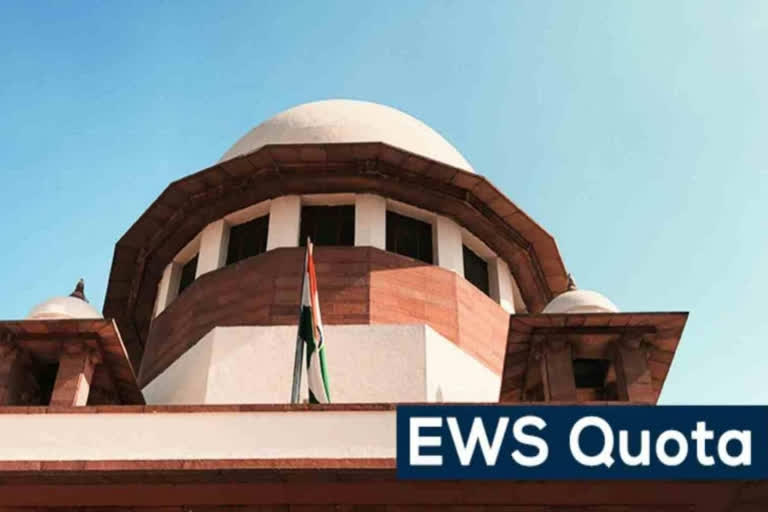New Delhi: In a historic but split verdict, the Supreme Court Monday upheld the validity of 10% quota for economically weaker sections in educational institutions and public sector employment. A five-judge constitution bench led by Chief Justice of India UU Lalit held that the constitutional amendment carried out by the Union Government was valid.
In order to provide reservation to economically weaker sections of society, Prime Minister Narendra Modi’s government enacted the 103rd Constitutional Amendment in January 2019, months before the General Elections. The petitioners and interveners had argued before the Supreme Court that the 103rd Constitutional Amendment was violative of the basic structure doctrine of the Constitution.
103rd Constitutional Amendment that allows EWS Quota
The Union Government amended Article 15 and 16 of the Constitution by way of the 103rd Constitutional amendment. These two articles fall under the Part III of the Constitution which deals with fundamental rights. While Part III in general deals with fundamental rights, Articles 14 to 18 deal with the Right to Equality.
Also read: Verdict on EWS, a setback to century-long struggle for social justice: TN CM
Of the total 5 Articles under the title of Right to Equality, two amended articles, 15 and 16, are aimed at prohibiting discrimination and ensuring equality in government jobs. While Article 15 deals with the prohibition of discrimination on grounds of religion, race, caste, sex, or place of birth, Article 16 is aimed at ensuring equality of opportunity in matters of public employment.
In its order, while upholding the validity of the 103rd Constitutional Amendment, the majority opinion of the bench noted that it needs to be stated that the amendment in question does not mandate but enables reservation for EWS and prescribes a ceiling limit of ten percent.
Article 15 (6) and Article 16 (6) of the Constitution
By way of the 103rd amendment, the government inserted two sub-clauses in Articles 15 and 16 to enable quota for economically weaker sections of the society both in admission to educational institutions and also in government and public sector jobs while excluding the sections already covered under Article 15 (4) and (5) and Article 16 (4).
While Article 15 prohibits discrimination on grounds of religion, race, caste, sex or place of birth mandating that the State shall not discriminate against any citizen on grounds only of religion, race, caste, sex, place of birth or any of them and that no citizen shall, on grounds only of religion, race, caste, sex, place of birth or any of them, be subject to any disability, liability, restriction.
Also read: Refer SC verdict on EWS reservation to full bench for review: CPI
On the other hand, Article 15 (3) says that nothing in Article 15 shall prevent the State from making any special provision for women and children. Similarly, Article 15 (4) and (5) allow the State to make special provisions for scheduled castes, scheduled tribes, and members of socially and economically backward classes.
In order to provide reservation to students from economically weaker sections of society, the 103rd Constitutional amendment inserted Article 15 (6) which says nothing in Article 15 or sub-clause (g) of clause (1) of article 19 or clause (2) of article 29 shall prevent the State from making any special provision for the advancement of any economically weaker sections of citizens other than the classes mentioned in clauses (4) and (5).
Article 15 (b) says that nothing in it shall prohibit the State from making any special provision for the advancement of any economically weaker sections of citizens other than the classes mentioned in clauses (4) and (5) in so far as such special provisions relate to their admission to educational institutions including private educational institutions, whether aided or unaided by the State, other than the minority educational institutions referred to in clause (1) of article 30, which in the case of reservation would be in addition to the existing reservations and subject to a maximum of ten per cent. of the total seats in each category.
Also read: Reservation for EWS is allowed but excluding SCs, STs and OBCs is to heap fresh injustice: SC
The 103rd amendment also provides explanation for the amendments made in both the Article 15 and 16 which says that for the purposes of Article 15 and article 16, "economically weaker sections" shall be such as may be notified by the State from time to time on the basis of family income and other indicators of economic disadvantage.
In addition to enabling quota for students from economically weaker sections of society, the government also inserted another enabling provision by Article 16 (6).
Article 16 of Part III of the Constitution is aimed at ensuring the Right of Equality in the matters of public sector employment which means government jobs both at the central and state level and other public sector undertakings.
Article 16 (6) says that nothing in the article shall prevent the State from making any provision for the reservation of appointments or posts in favour of any economically weaker sections of citizens other than the classes mentioned in clause (4), in addition to the existing reservation and subject to a maximum of ten percent of the posts in each category.



